Aaron Rodgers, the renowned New York Jets quarterback, finds himself at a critical juncture in his career. After returning to the NFL with hopes of revitalizing his legacy, the outcome of the 2023 season has left fans and analysts questioning what lies ahead for the veteran player. Rodgers suffered an Achilles injury just moments into the season, leading to a disappointing record of 5-12 for the Jets and casting shadows over his future. As he grapples with his options, fellow Hall of Famer Brett Favre has stepped into the conversation, offering insights drawn from his own storied career.
Favre’s perspective is invaluable, stemming from his own experience navigating the complexities of professional football and retirement. His recent comments suggest that he still believes in Rodgers’ potential, asserting, “He’s got something left.” With 20 seasons of highs and lows, Favre recognizes the physical and emotional forces at play in the life of an aging quarterback. The dichotomy of Rodgers’ immense talent and the harsh realities of injury and performance pressures presents a unique challenge. Favre’s acknowledgment of the factors weighing on Rodgers highlights the internal conflict that many athletes experience when considering retirement, especially after a tortuous season.
Analyzing Rodgers’ performance in 2023 reveals a season riddled with obstacles. Despite throwing for nearly 3,900 yards and securing 28 touchdowns, the stark reality of 11 interceptions and a staggering 40 sacks points to a frustrating year. Favre’s remarks about whether Rodgers “wants to” continue give weight to the understanding that motivation can be as critical as physical ability. This mirrors the struggles numerous athletes face as they assess their performance within the context of ongoing injuries and the demands of returning to elite form.
The question of Rodgers’ future goes beyond mere performance statistics. As he stands at this metaphorical fork in the road, he not only contemplates his own desires but also the impact his decision might have on the Jets organization and their fans. Favre’s own indecision during his career—choosing to retire only to return to the game—resonates with the pressures and emotional tumult that accompany such choices. For Rodgers, the crux of the issue may ultimately boil down to a love for the game versus the physical costs associated with its demanding nature.
As the NFL landscape shifts and speculations abound regarding his potential next steps, the question remains: will Aaron Rodgers take the leap back onto the field? With Favre’s encouragement, there seems to be a glimmer of hope that, if he chooses to persist, Rodgers could yet reclaim his former glory. The decision will not be simple, but as Favre highlights, the spirit of competition and the desire to play can be powerful motivators. In a sport where legacies are built on resilience, the upcoming months could shape not only Rodgers’ future but the broader narrative of his illustrious career.

